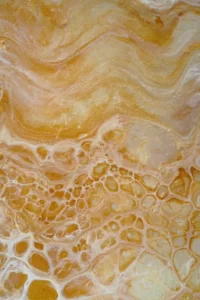Table of Contents
Introduction
In recent years, there has been a growing interest in using Manuka honey for wound care in pets. Manuka honey, which comes from the flowers of the Manuka tree found in New Zealand, has long been valued for its healing properties. Its antibacterial and anti-inflammatory effects make it a popular natural remedy for various health conditions, including wound healing.
Pet owners are increasingly turning to Manuka honey as an alternative or complementary treatment for their pets’ wounds. This article will explore the benefits of using Manuka honey for wound care in pets, its effectiveness in promoting healing, and how to properly use it for this purpose. By the end of this article, pet owners will have a better understanding of the potential benefits of using Manuka honey for wound care in their furry friends.
Benefits of Manuka Honey for Wound Care in Pets
Manuka honey has been used for centuries to treat a wide range of health conditions in humans. Its antibacterial properties are well-documented, and it is known to be effective against a variety of bacteria, including antibiotic-resistant strains. These properties make Manuka honey an attractive option for wound care in pets, as it can help prevent infection and promote healing.
Additionally, Manuka honey has anti-inflammatory effects, which can help reduce swelling and pain associated with wounds. It also provides a moist environment that is conducive to wound healing, as it helps keep the wound hydrated and promotes the growth of new tissue. This can be particularly beneficial in pets, as they often have a tendency to lick or scratch at their wounds, which can hinder the healing process.
How Manuka Honey Works for Wound Healing in Pets
Manuka honey’s healing properties stem from its unique chemical composition. It contains a high concentration of hydrogen peroxide, which has been shown to have antibacterial properties. The presence of compounds known as methylglyoxal (MGO) and dihydroxyacetone (DHA) further enhance its antibacterial effects. These compounds are not found in other types of honey, making Manuka honey particularly potent in its ability to fight bacteria.
In addition to its antibacterial properties, Manuka honey also has anti-inflammatory effects. It can help reduce inflammation and swelling around the wound, which can aid in the healing process. The presence of antioxidants in Manuka honey further contributes to its healing properties, as antioxidants help protect cells from damage and promote tissue repair.
Using Manuka Honey for Wound Care in Pets
When using Manuka honey for wound care in pets, it is important to use a medical-grade honey with a high UMF (Unique Manuka Factor) rating. The UMF rating indicates the concentration of antibacterial compounds in the honey, with higher ratings indicating greater potency. A UMF rating of 10 or above is generally recommended for wound care purposes.
To apply Manuka honey to a pet’s wound, first, clean the wound gently with a mild antiseptic solution and pat it dry. Then, apply a thin layer of Manuka honey directly to the wound. Cover the wound with a sterile dressing or bandage to protect it and keep the honey in place. The dressing should be changed regularly to ensure proper healing.
It is important to note that while Manuka honey is generally safe for topical use on pets, it should not be ingested by animals or used on deep or severe wounds without veterinary guidance. If you have any concerns or questions about using Manuka honey for wound care in your pet, consult with your veterinarian for personalized advice.
Precautions and Considerations
While Manuka honey is generally safe for topical use on pets, there are some precautions and considerations to keep in mind when using it for wound care.
-
Allergies: Some animals may be allergic to honey, including Manuka honey. It is important to monitor your pet for any signs of an allergic reaction, such as redness, swelling, or itching. If your pet shows any adverse reactions, discontinue the use of Manuka honey and consult with your veterinarian.
-
Quality and Purity: When purchasing Manuka honey for wound care, it is essential to ensure that you are getting a high-quality, pure product. Look for reputable brands that provide a UMF rating and are sourced from trusted producers.
-
Storage and Shelf Life: Manuka honey should be stored in a cool, dry place away from direct sunlight. It has a long shelf life, but it is important to check the expiration date before using it on your pet’s wounds. Expired honey may not have the same potency and effectiveness in promoting wound healing.
-
Veterinary Guidance: It is always recommended to consult with your veterinarian before using any new treatments or remedies on your pet. They can provide personalized advice and guidance based on your pet’s specific needs and health condition.
Conclusion
Manuka honey has gained popularity in recent years as a natural remedy for wound care in pets. Its antibacterial, anti-inflammatory, and wound-healing properties make it an attractive option for pet owners looking for alternative or complementary treatments. When used properly and under veterinary guidance, Manuka honey can help promote the healing of wounds in pets and prevent infection. As with any treatment, it is important to exercise caution and consult with a veterinarian for personalized advice. Manuka honey for wound care in pets can be a valuable addition to a comprehensive wound care plan, helping your furry friend heal more quickly and comfortably.



